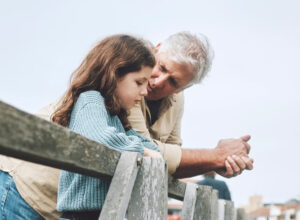How to Talk to Kids About Lung Cancer
Children can be scared to know that a family member has lung cancer, and without help, they could become overwhelmed. To ease their fears, parents should talk honestly to kids about a loved one’s lung cancer and what they can expect. Find tips on talking to children about lung cancer below.
Telling Children that a Family Member Has Lung Cancer
 Telling a child that a parent, grandparent, or another loved one has lung cancer can be challenging. You may even consider avoiding any cancer discussions, particularly with younger kids.
Telling a child that a parent, grandparent, or another loved one has lung cancer can be challenging. You may even consider avoiding any cancer discussions, particularly with younger kids.
However, it’s in everyone’s best interest to have an open, honest, and simple discussion about lung cancer. Children can sense that adults are struggling or hiding things from them, leading to fear and even resentment.
Telling kids that someone they love has lung cancer is the best way to help them. Learn specific tips for discussions about lung cancer diagnosis, treatment, and life expectancy below.
“The conversation may not seem easy, but taking a proactive stance and discussing difficult events in age-appropriate language can help a child feel safer and more secure.”
— American Psychological Association
You can also get a free case review after to see if you qualify for lung cancer compensation. This can help cover treatment costs and protect your family’s financial future.
- Access Financial Aid and Justice
- Learn About Your Options
- Contact Us for Free

Tips to Prepare for Talking to Kids About Lung Cancer
Choosing the right time and place is one of the most important things to consider before you tell a child about a lung cancer diagnosis.
For example, a calm weekend in a safe, private space with caregivers and loved ones is often a good setting for a difficult conversation.
You can also prepare by:
- Practicing what you want to say. Plan ahead and prepare what you want to tell your child. Try to be as simple and direct as possible.
- Not being afraid to get emotional. Kids can sense emotions. Suppressed emotions from adults can contribute to anxiety, frustration, and fear in children.
- Having a routine. Keeping a consistent routine will help kids stay calm about the future. However, you will also want to prepare them for changes in routines due to doctor’s appointments and cancer treatments.
- Setting aside more family time. Spending more time with family can help children navigate the uncertainty that comes with a cancer diagnosis. It also helps them know they are loved, supported, and valued. Remember that children of different ages will react differently to cancer discussions. It’s important to adjust all conversations for their specific age group.
Remember that children of different ages will react differently to cancer discussions. It’s important to adjust all conversations for their specific age group.
“Children need to know enough to be prepared for what’s about to happen and how it will affect them. Younger children usually need less detail than older kids.”
— American Cancer Society
Talking to Children About a Lung Cancer Diagnosis
After receiving a lung cancer diagnosis, it’s important to promptly tell those you love, including children or grandchildren.
Keep these tips in mind when talking to kids about a cancer diagnosis:
- Be simple and direct. Don’t be afraid to plainly say “lung cancer” and explain how it impacts the body. Be sure to tell kids that it is not contagious.
- Let children ask questions and express their emotions. Answer questions honestly and clearly and let them know that they’ll always be loved and taken care of. It’s also okay to tell children if you don’t have an answer to their question.
- Remind kids that they did not cause their loved one’s sickness. Children under the age of 10 may wonder if they did something to cause their loved one’s cancer. Explain that cancer is not their fault or responsibility.
- Seek additional support. If a child is experiencing extreme emotions, see if a psychologist, counselor, or social worker has resources to help them.
Children may react in different ways after hearing a loved one has lung cancer. They may be angry, sad, or even physically feel sick.
Remember to allow kids time to adjust and be patient with them. Also, ensure they know they are allowed to feel their emotions at this time, whatever that may be.
Helping Children Understand Lung Cancer Treatment
Despite efforts to keep things as normal as possible, children might notice how lung cancer treatment is affecting a loved one.
As you talk to kids about cancer treatment, keep these tips in mind:
- Prepare them for hospital stays. Young children may feel abandoned or lonely while a close family member is in the hospital getting treated. Reassure them that this is just part of the patient getting better and, if possible, try to arrange a visit.
- Explain symptoms and side effects. Children may start to see physical changes in their loved one and become worried or frustrated. Make sure to explain that hair loss, fatigue, weight changes, and weakness are normal.
- Talk about the treatment plan and timeline. Explaining the type of treatments a loved one will be receiving and how long they will take may help children regain a sense of control.
By keeping communication open, you can reassure children that someone they love is getting the best lung cancer treatments to help them feel better.
Explaining Lung Cancer Prognosis to Kids
The prognosis for lung cancer (health outlook) is different for each patient. Explaining what to expect can help children feel more secure and less anxious.
Here are some tips for talking to children about a cancer prognosis:
- Be prepared to talk about death. After learning about a loved one’s cancer prognosis, children may begin asking questions about death. Always be honest with children if a loved one’s cancer prognosis is poor.
- Don’t use complicated medical terms. Young children may not easily understand medical terms like “prognosis” and become frustrated. Instead, try saying something like, “This cancer is serious, but doctors are trying their best to help Grampa feel better and live longer.”
- Keep children updated. A lung cancer prognosis can change over time, for better or for worse. Be sure to share any significant updates with children.
“The goal is to tell the truth in such a way that children can understand and prepare themselves for the changes that will happen.”
— American Cancer Society
Get a free case review for help affording treatments that could improve your lung cancer prognosis and keep children or other loved ones financially secure.
- Access Financial Aid and Justice
- Learn About Your Options
- Contact Us for Free



Talking to Children About the Loss of a Loved One to Cancer
It can be difficult to know what to tell kids when a parent, grandparent, or another relative passes away from cancer, especially when you are navigating your own feelings.
Use these tips when talking to children who have lost a loved one to cancer:
- Let them grieve. Children will express losing a loved one in different ways. Give them the space they need to safely feel and process these emotions.
- Practice the conversation. You can prepare what you’ll say with a trusted family member who can give you feedback on your word choice and tone.
- Use words that are clear and specific. Avoid using euphemisms such as “sleeping forever” when speaking to young children. This may cause more confusion and fear.
Losing a family member changes a child’s life forever. Always remind them that they’ll be loved and supported no matter what, and walk with them through the grief you’re both feeling.
Resources for Children and Families Coping with Lung Cancer
Telling children someone they love has cancer can be difficult. Thankfully, families and their loved ones don’t have to go through this alone.
Resources like one-on-one therapy and support groups can greatly help children grieving a loved one with cancer, as well as help those navigating a lung cancer diagnosis.
Lung Cancer Group may also be able to help patients with asbestos lung cancer access financial compensation following a diagnosis. This compensation can cover treatment expenses and provide financial stability for next of kin, including children.
Some financial compensation resources include:
- Lung cancer lawsuits that can award hundreds of thousands of dollars
- Asbestos trust fund claims ($30 billion+ available)
- Benefits from the U.S. Department of Veterans Affairs (VA)
Call (877) 446-5767 or get a free case review to learn how we can help you during this difficult time.

